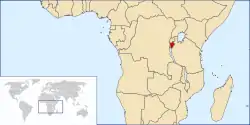United Nations Security Council Resolution 1692
United Nations Security Council Resolution 1692, adopted unanimously on June 30, 2006, after recalling resolutions on the situation in Burundi and the African Great Lakes region, particularly resolutions 1650 (2005) and 1669 (2006), the Council extended the mandate of the United Nations Operation in Burundi (ONUB) until December 31, 2006.[1]
| UN Security Council Resolution 1692 | |
|---|---|
 Burundi | |
| Date | 30 June 2006 |
| Meeting no. | 5,479 |
| Code | S/RES/1692 (Document) |
| Subject | The situation in Burundi |
Voting summary |
|
| Result | Adopted |
| Security Council composition | |
Permanent members | |
Non-permanent members | |
Resolution
Observations
The Security Council praised the Burundian people for the completion of the transitional period where authority had been transferred to democratically elected government and institutions. The resolution welcomed negotiations between the Palipehutu and Burundian government, facilitated by South Africa.[2] It recognised that, although there was an improvement in the security situation, there were still "factors of instability" present in Burundi and the Great Lakes region of Africa.
Acts
Acting under Chapter VII of the United Nations Charter, the Security Council extended the mandate of ONUB until the end of 2006. It also extended the temporary redeployment of military and civilian police personnel from the ONUB to the United Nations Mission in the Democratic Republic of the Congo (MONUC) until September 30, 2006.
Finally, Council members welcomed the intention of the Secretary-General Kofi Annan to establish the United Nations Integrated Office in Burundi, to succeed ONUB.
See also
References
- "Security Council extends mandate of Burundi operation until 31 December". United Nations. June 30, 2006.
- "U.N. votes to wrap up peacekeeping force in Burundi at year's end". The Star (Malaysia). 1 July 2006.
External links
 Works related to United Nations Security Council Resolution 1692 at Wikisource
Works related to United Nations Security Council Resolution 1692 at Wikisource- Text of the Resolution at undocs.org